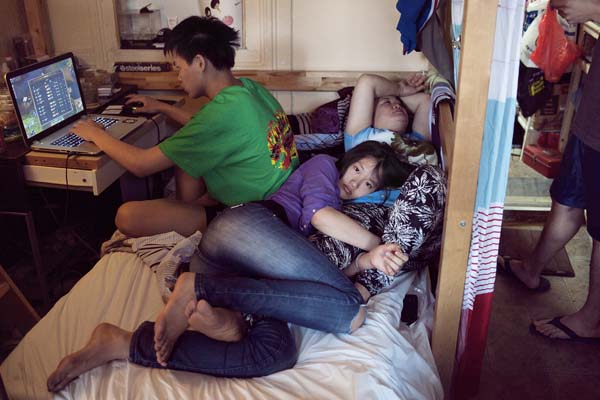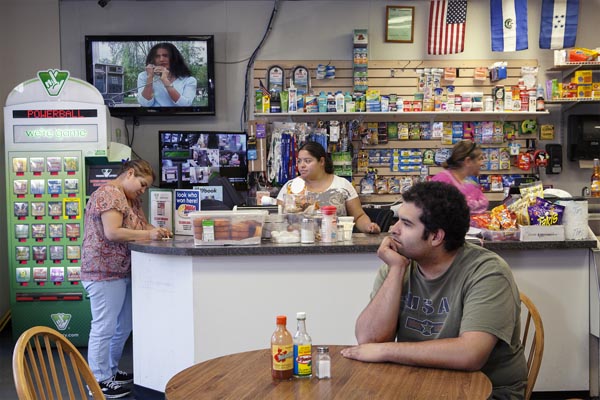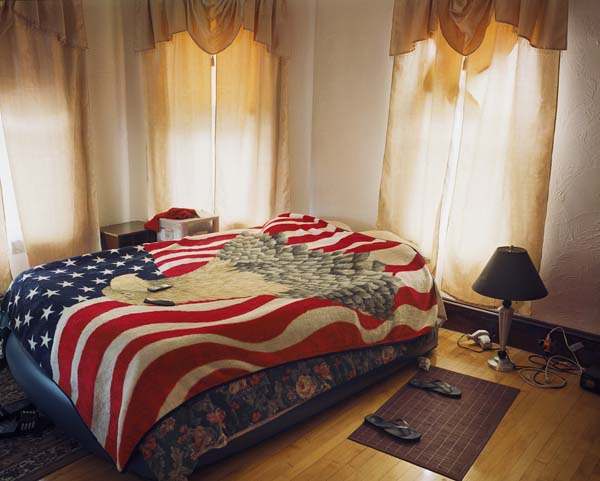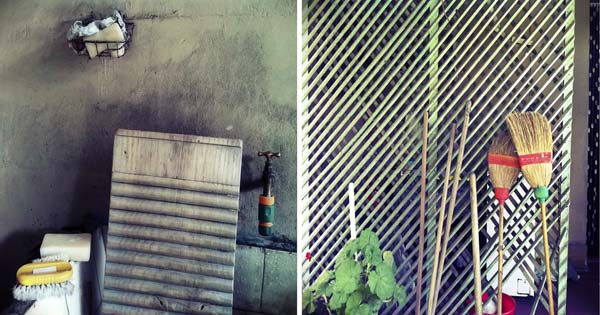(HUDSON, N.Y.) – The contemporary American immigrant experience is the focus of two solo exhibitions of photography by Thomas Holton and Edie Bresler and a portfolio showcase of images by Mary Beth Meehan and Eleonora Ronconi at Davis Orton Gallery, opening with a reception on Saturday, May 16, from 5 to 7 pm., and remaining on view through June 21, 2015.
From the closely documented world of a family in New York City’s Chinatown to small shop owners across the country who sell lottery tickets; to undocumented people in our midst to the experience of adapting to the US while longing for the connections to home, the photographs are timely, resonant, and suggestive of the promise – fulfilled or otherwise – of America.
In “The Lams of Ludlow Street,” by Thomas Holton, one family’s life, from 2002 to the present, unfolds in a 350 square foot apartment in New York City’s Chinatown.
Thomas Holton’s work has been exhibited widely, including at The Museum of the City of New York, New York Public Library, Sasha Wolf Gallery and the China-Lishui International Photography Festival. In 2005 he was one of the twenty-four photographers chosen by the Art + Commerce Festival for Emerging Photographers, and in 2006, American Photo magazine named him one of the country’s ten best Young Photographers. Kehrer Verlag will publish his work, The Lams of Ludlow Street, Fall of 2015. The Lams work was published in Aperture (2007), featured twice by The New York Times (2008 and 2012) as well as published in numerous other magazines, newspapers and websites. Holton received his MFA from The School of Visual Arts in 2005 He lives in Brooklyn, NY.
In “We Sold a Winner,” Edie Bresler’s photographs and their accompanying stories are portraits of resilience, desire, seduction and a changing American dream. She focuses on main street America through the lens of state lotteries. In towns and cities across the country, small family owned convenience and liquor stores are the largest group of retailers selling lottery tickets. Many owners are immigrants while others are the third or fourth generation to run the family business. They are hard-working small business owners looking for their piece of the American dream. If they sell a winning jackpot ticket they receive a bonus commission, ranging from $5000 to $500,000 depending on state rules. Owners who sell a winning ticket that is never claimed, do not receive their bonus commission and every year hundreds of millions of dollars in winning tickets are unclaimed.
This complex local economy is massive and often overlooked. Since 9/11, the US government has spent $536 billion on the war in Afghanistan while Americans spent $532.6 billion buying lottery tickets. In lieu of higher taxes, state-sponsored gaming sells hope through hype. Whether you are pro, con or indifferent, it is likely your community relies on its share of lottery profits. Bresler seeks greater awareness and empathy for the people and places on the front line of this hidden economy and the value they provide within our communities.
Edie Bresler has exhibited in solo shows at the Irene Carlson Gallery of Photography in California; the Griffin Museum of Photography and the Boston Center for the Arts in Massachusetts; Visual Studies Workshop and CEPA in New York and in numerous group exhibitions. She is a Critical Mass 2014 finalist. Features include Slate Magazine, Photo District News, Lenscratch, Business Insider, Esquire Russia, Feature Shoot, the PBS show Greater Boston with Emily Rooney, Virgin Airlines Voyeur Magazine, and Social Documentary. Bresler has been awarded grants from the Massachusetts Cultural Council, Simmons College Faculty Fund for Research, and the Berkshire Taconic Artist Resource Trust. She writes regularly for Photograph Magazine and leads the photography program at Simmons College in Boston.
Portfolio Showcase: Newcomers – The Immigrant Experience Selected through national competition.
Mary Beth Meehan, Undocumented
Between 11- and 20-million undocumented immigrants live in the United States today, fueling a national fury over citizenship and immigration policy. Many of these people are deeply embedded in our communities, yet have been painted with one brush as “drug smugglers, human smugglers, gang members and child molesters” (Arizona State Senator Russell Pearce). Because they cannot come forward to defend themselves, their true identities as people remain in the shadows.Meehan’s photographs were made inside the homes of undocumented residents in New England. By exploring the texture of their living spaces, Meehan’s goal is to make visible the lives of these human beings who must, for legal and political reasons, remain invisible.
“I ask myself if I can enter the home of a human being who is afraid to be identified, and use photography to make him or her somehow seen? My hope is to open a window onto these almost forbidden spaces, ones that are, ironically, full of the daily ordinariness of life.”
Mary Beth Meehan is a photographer and educator whose work engages the communities in which she lives. Her goal is to use photography to create connections among people that may be obscured by conceptions of economics, politics, or race. Her work has been published in 6Mois Magazine and Le Monde (France), The New Statesman (U.K.), Bird Magazine (Japan), and featured on New York Times: LENS; it has been shown in solo exhibitions at Smith College and at the Griffin Museum of Photography, was exhibited at the Ring Cube Gallery, Tokyo, and the Photographic Resource Center, Boston, and was featured in two New England Photography Biennial exhibitions at the Danforth Museum of Art. She has received grants from the Massachusetts Cultural Council and the Rhode Island State Council on the Arts.
A former staff photographer at The Providence Journal, Meehan has since contributed to The New York Times, The Boston Globe, and The Washington Post, and received the 2012 Rhode Island State Council on the Arts Fellowship in Photography. She was nominated twice for the Pulitzer Prize, and has been honored by Pictures of the Year International and the National Conference for Community and Justice.
Eleonora Ronconi, Seras Mis Ojos.
Eleonora Ronconi has lived in California since 1998, but Buenos Aires remains her home. As she struggled to adapt to living in the United States, she began to lose connection to her identity and her grounding. Then, on one of her trips to Buenos Aires in 2011, she decided to revisit the place she knew so well. She photographed things that had been an important part of her life – family photographs, her friends, her first communion dress, her aunt – her only close relative – and places she visited with her father who passed away when she was a teenager. Like a jigsaw puzzle, the pieces started coming together – reconstructing a life that had begun to feel out of focus.
Eleonora Ronconis photographs have been published by Adore Chroma, Aesthetica Magazine, the Maine Department of Labor, F-Stop Magazine, Fraction Magazine, Lenscratch and Le Journal de la Photographie among others. She is a Critical Mass Finalist for 2012. Her first solo exhibition was in her native Buenos Aires in 2009. Recent group shows include work at The Griffin Museum of Photography, Rayko Gallery, Wall Space Gallery and Triton Museum of Art.
Ronconi was born in Buenos Aires, Argentina. She settled in California In 1998 and now lives and works in Santa Clara, CA where she specializes in conference interpreting.
The Davis Orton Gallery on Hudson’s historic Warren Street exhibits contemporary photography, mixed media and a growing number of artist-published photobooks. The goal of the gallery is to present artists, from emerging to mid-career to established, whose work deserves a broader audience.




